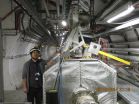(Press-News.org) LAWRENCE -- Researchers at the University of Kansas working with an international team at the Large Hadron Collider have produced quark-gluon plasma -- a state of matter thought to have existed right at the birth of the universe -- with fewer particles than previously thought possible.
The material was discovered by colliding protons with lead nuclei at high energy inside the supercollider's Compact Muon Solenoid detector. Physicists have dubbed the resulting plasma the "littlest liquid."
"Before the CMS experimental results, it had been thought the medium created in a proton on lead collisions would be too small to create a quark-gluon plasma," said Quan Wang, a KU postdoctoral researcher working with the team at CERN, the European Organization for Nuclear Research. Wang performed key analysis for a paper about the experiment recently published in APS Physics.
"Indeed, these collisions were being studied as a reference for collisions of two lead nuclei to explore the non-quark-gluon-plasma aspects of the collisions," Wang said. "The analysis presented in this paper indicates, contrary to expectations, a quark-gluon plasma can be created in very asymmetric proton on lead collisions."
The unexpected discovery was said by senior scientists associated with the CMS detector to shed new light on high-energy physics.
"This is the first paper that clearly shows multiple particles are correlated to each other in proton-lead collisions, similar to what is observed in lead-lead collisions where quark gluon plasma is produced," said Yen-Jie Lee, assistant professor of physics at MIT and co-convener of the CMS heavy-ion physics group. "This is probably the first evidence that the smallest droplet of quark gluon plasma is produced in proton-lead collisions."
The KU researcher described quark-gluon plasma as a very hot and dense state of matter of unbound quarks and gluons -- that is, not contained within individual nucleons.
"It's believed to correspond to the state of the universe shortly after the Big Bang," Wang said. "The interaction between partons -- quarks and gluons -- within the quark-gluon plasma is strong, which distinguishes the quark-gluon plasma from a gaseous state where one expects little interaction among the constituent particles."
While high-energy particle physics often focuses on detection of subatomic particles, such as the recently discovered Higgs Boson, the new quark-gluon-plasma research instead examines behavior of a volume of such particles.
Wang said such experiments might help scientists to better understand cosmic conditions in the instant following the Big Bang.
"While we believe the state of the universe about a microsecond after the Big Bang consisted of a quark-gluon plasma, there is still much that we don't fully understand about the properties of quark-gluon plasma," he said. "One of the biggest surprises of the earlier measurements at the Relativistic Heavy Ion Collider at Brookhaven National Laboratory was the fluid-like behavior of the quark-gluon plasma. Being able to form a quark-gluon plasma in proton-lead collisions helps us to better define the conditions needed for its existence."
Wang continues his research at CERN's Large Hadron Collider, performing analysis and working on the operations of a Zero Degree Calorimeter maintained by KU.
"You have to see the apparatus," he said. "It is amazing."
INFORMATION:
The KU group at CERN, together with researchers from Rice and Vanderbilt universities, played a leading role in the analysis published by APS Physics. The group is supported by the U.S. Department of Energy.
DARIEN, IL - A new study shows that high school students lose sleep on school nights following the change to daylight saving time that occurs in March. The loss of sleep during the school week was associated with a decline in vigilance and cognitive function, which raises safety concerns for teen drivers.
Results show that the average objectively measured sleep duration on the weeknights after the spring time change declined to 7 hours, 19 minutes, which reflects a mean loss of 32 minutes per night compared with the school week prior to the implementation of daylight ...
MADISON, Wis. - Orchids, a fantastically complicated and diverse group of flowering plants, have long blended the exotic with the beautiful. Most species live on trees, often in remote, tropical mountains. Their flowers can be strange -- one even flowers underground, and many species deceive their pollinators into thinking they are good to eat.
Some are florist's staples, like phalaenopsis, the hot-pink and white flower that is easy to grow and easier to sell. Beyond the "job" of looking beautiful, only the vanilla orchids have any commercial role.
The estimated ...
Repeated exposure to anesthesia early in life causes alterations in emotional behavior that may persist long-term, according to a study from the Icahn School of Medicine at Mount Sinai in collaboration with the Yerkes National Primate Research Center, and published in the Online First edition of Anesthesiology, the official medical journal of the American Society of Anesthesiologists®.
Each year, approximately one million children under the age of four undergo surgery with general anesthesia, according to the U.S. Food and Drug Administration (FDA). Retrospective ...
A study that used stored blood samples from U.S. Air Force personnel who conducted aerial herbicide spray missions of Agent Orange during the Vietnam war found a more than 2-fold increased risk of the precursor to multiple myeloma known as monoclonal gammopathy of undetermined significance (MGUS), according to an article published online by JAMA Oncology.
While the cause of MGUS and multiple myeloma (plasma cell cancer) remains largely unclear, studies have reported an elevated risk of multiple myeloma among farmers and other agricultural workers and pesticides have ...
CAMBRIDGE, Mass. -- The technology behind 3-D printing is growing more and more common, but the ability to create designs for it is not. Any but the simplest designs require expertise with computer-aided design (CAD) applications, and even for the experts, the design process is immensely time consuming.
Researchers at MIT and the Interdisciplinary Center Herzliya in Israel aim to change that, with a new system that automatically turns CAD files into visual models that users can modify in real time, simply by moving virtual sliders on a Web page. Once the design meets ...
CAMBRIDGE, Mass. (September 3, 2015) - In the breast, cancer stem cells and normal stem cells can arise from different cell types but tap into distinct yet related stem cell programs, according to Whitehead Institute researchers. The differences between these stem cell programs may be significant enough to be exploited by future therapeutics.
Deadly tumor-initiating cells seed metastases throughout the body and cause relapses in patients. Whether these tumor-initiating cells can also be referred to as stem cells, specifically, cancer stem cells, has been up for debate. ...
A brief series of classes to help first-time parents better support each other through the often stressful transition to parenthood has a positive effect on birth outcomes as well, according to health researchers.
A decade ago Mark Feinberg, research professor at the Bennett Pierce Prevention Research Center for the Promotion of Human Development, Penn State, developed Family Foundations, a series of classes for expectant parents. In two research trials, the program was shown to improve the way parents support each other -- to reduce parental stress, depression and anxiety; ...
AUSTIN, Texas -- Evidence from the tropical lowlands of Central America reveals how Maya activity more than 2,000 years ago not only contributed to the decline of their environment but continues to influence today's environmental conditions, according to researchers at The University of Texas at Austin.
Synthesizing old and new data, researchers were the first to show the full extent of the "Mayacene" as a microcosm of the early anthropocene -- a period when human activity began greatly affecting environmental conditions.
"Most popular sources talk about the anthropocene ...
In some patients, aggressive cancers can become resistant to chemotherapy and radiation treatments. In a paper published in the journal Nature Communications, University of California, San Diego School of Medicine researchers identified a pathway that causes the resistance and a new therapeutic drug that targets this pathway.
"It was previously known that RAF (a family of proteins that regulate cellular signaling) governs resistance to therapies. We discovered an undescribed role for RAF and learned precisely how it occurs in a broad range of cancers," said lead author ...
PHILADELPHIA -- Acupuncture may be a viable treatment for women experiencing hot flashes as a result of estrogen-targeting therapies to treat breast cancer, according to a new study from researchers at the Perelman School of Medicine at the University of Pennsylvania. Hot flashes are particularly severe and frequent in breast cancer survivors, but current FDA-approved remedies for these unpleasant episodes, such as hormone replacement therapies are off-limits to breast cancer survivors because they include estrogen. The results of the study are published this week in the ...


